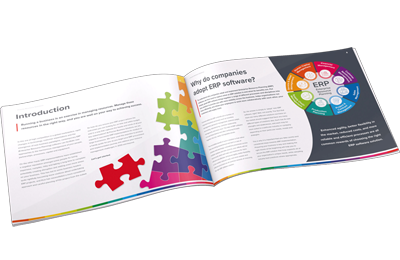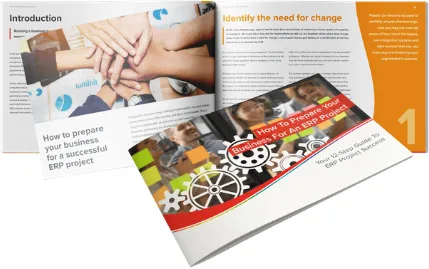Precise ERP Success Framework
The Precise ERP SUCCESS Framework is an over-arching set of guiding principles, covering the essential components required for a successful project.
The ERP Success Framework goes beyond the implementation of the software itself and the project team, to encompass all aspects of an ERP (Enterprise Resource Planning) project and ensure relevant stakeholders, resources and impacts are considered.
The ERP SUCCESS Framework has been designed as a resource for both our customers, and our people at Precise to reference. This helps to maintain alignment across the project team.
Expand each of the sections below to learn more about what is involved in ensuring a successful project.

Hiding item
Your content goes here. Edit or remove this text inline or in the module Content settings. You can also style every aspect of this content in the module Design settings and even apply custom CSS to this text in the module Advanced settings.
Strategise The Project
An ERP (Enterprise Resource Planning) Project for any business is a key strategic initiative. It must be aligned with the company’s goals and should not be seen as a side project. It should be supported and sponsored by all stakeholders in the business, from the Board through to all impacted departments and users. If there is no alignment with the business strategies, the project will not get the priority and resources it requires to be successful.
Understand The Objectives
Every project requires a way to measure success. Many businesses implement a new ERP system with the goal to simply replace what they have. This is risky and a missed opportunity to implement process improvements. What is the business trying to achieve with this project? How can the return on investment be measured? The project objectives need to be specific and should be front and centre throughout the entire project. You need to be able to determine what that success looks like before the project begins.
Cast The Team
A project of this size and impact on an organisation requires a team to chart the course and stay on track. The project team representing the customer is just as important as the project team representing the software vendor. The key roles in the customer’s project team are the Project Sponsors, the Project Manager and the Subject Matter Experts. Project Sponsors ensure there is executive support and sufficient priorities and resources made available. The Project Manager keeps the project on track and works closely with the software vendor’s Project Manager – managing tasks, resources, scope/budget and risk. Subject Matter Experts have a deep understanding of the business processes that will be implemented within the project. These roles are essential in navigating the project in the right direction towards success.
Control The Scope
One reason an ERP implementation may be viewed as unsuccessful is due to scope creep which can result in a big blow-out in budget or time. The project scope defines the journey towards the destination and must align with the agreed project objectives to facilitate a successful outcome. Keeping the project on course and controlling variations can be challenging, but it is essential. The scope also defines the project timeframes and the ideal outcome is completing a project on time and on budget.
Engage The Users
Whilst a well aligned project team is a key element in an ERP project, the end users are equally important. The project will not be deemed a success if the users don’t adopt the system and take ownership, even if it ticks all of the boxes. A project is likely to be more successful if you can get the users involved in the project early by communicating the changes throughout the life of the project. What is happening and why? How will this affect them? How can they contribute to the success of the project? Involve the end users in the testing phase as they have the most knowledge about the business processes. Communication and collaboration is key and will empower the users to adopt and continuously improve the system after go live.
Seek Extra Help
Implementing an ERP system is a big commitment for an organisation and more often than not, most people involved on the customer side of the project haven’t had previous experience in this area.
Help can be found in many forms throughout the entire life of the project. Seek expertise in areas such as business process mapping, Lean Six Sigma, value stream mapping, change management and project management. Look for business consultants who are industry specialists and have helped similar businesses make significant change and contributed towards transformational improvements.
Advice can also be sought from industry forums and user groups within business communities. Don’t be afraid to ask for help, as it usually makes a significant contribution towards project success.
Support Ongoing Success
Going live with the system in an ERP project is an exciting milestone but should be managed carefully. Even though the goal is system ownership, this is not the time for users to be left on their own to navigate challenges that a new system may create. Ensure there is plenty of support available both internally and externally to avoid the users becoming overwhelmed. Ongoing success extends beyond go-live and requires continual pulse checks where existing processes are challenged for possible improvement. It involves more than fixing issues and answering queries – it is the opportunity to build upon the foundations that have been created during implementation, driving business improvements and eventually business transformation.
Interested in learning more about how we work collaboratively with our customers for ERP project success?
Contact us to find out more about how the Precise ERP SUCCESS Framework and our overall implementation approach will help you to implement your ERP solution smarter and faster.
Our team will be happy to discuss any questions or concerns you may have about replacing your current ERP system or implementing an ERP system for the first time. Whether you are just researching your options, or you are currently in the throes of software selection, we can help you at every step of the way.

Is Your Business ERP Ready?
Prepare your business for a successful Enterprise Resource Planning (ERP) project with our 12-step guide to success
What Our
Customers Say

